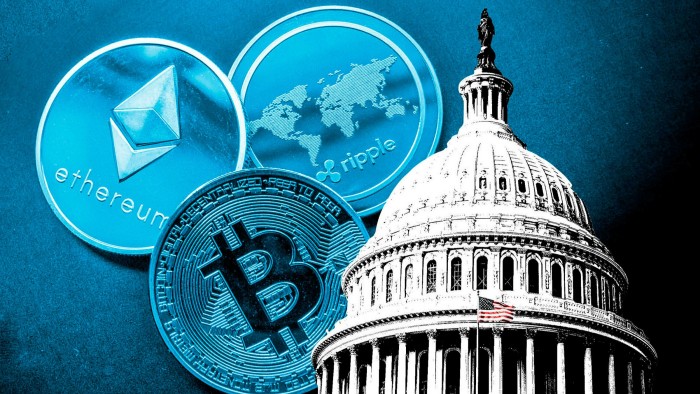Asset managers rush to file applications for bitcoin futures ETFs

Simply sign up to the Exchange traded funds myFT Digest -- delivered directly to your inbox.
Interested in ETFs?
Visit our ETF Hub for investor news and education, market updates and analysis and easy-to-use tools to help you select the right ETFs.
At least four asset managers have filed for ETFs that invest in bitcoin futures after Securities and Exchange Commission chair Gary Gensler earlier this month indicated that he could approve such funds. But investors may not want them in lieu of physically backed bitcoin ETFs, analysts have said.
Valkyrie Investments is the latest fund shop to throw its hat into the ring with the futures-focused Valkyrie Bitcoin Strategy ETF, which it disclosed plans for last week.
The ETF will not directly invest in bitcoin but will instead purchase bitcoin futures contracts. As the contracts approach expiration, they will be replaced by similar ones that have later expiration dates, according to the filing.
VanEck, meanwhile, has just disclosed plans to launch a bitcoin futures ETF that resembles a similar fund it had filed for in 2017. The prior version never launched.
In addition to investing in bitcoin futures, the VanEck Bitcoin Strategy ETF will also invest in ETFs listed in Canada that provide exposure to the underlying digital asset, the filing said.
Neither fund divulged an expense ratio or launch date.

This article was previously published by Ignites, a title owned by the FT Group.
Invesco and ProShares earlier this month filed to launch bitcoin-tracking ETFs that would invest in futures.
But such ETFs, even if they are approved as Gensler indicated, may not satisfy investor appetite for bitcoin ETFs that track the physical asset, analysts said.
Investors were more drawn to ETFs that invest in physically backed bitcoin, said Neena Mishra, director of ETF research at Zacks Investment Research. She compared ETFs that track gold, such as the $57bn SPDR Gold Trust and the $27.6bn iShares Gold Trust, to those that buy gold futures, including the $83m Invesco DB Gold Fund.
The SPDR Gold Trust bled $11.8bn over the year ended July 31, while the iShares Gold Trust garnered $872m, according to FactSet. The former launched in 2004, and the latter debuted in 2005, according to ETF.com. The Invesco DB Gold Fund, meanwhile, bled $61.6m over a one-year period ended July 31. The fund was born in 2007.
“While investor education is important, I think investors understand the difference between a bitcoin futures ETF and one that actually tracks bitcoin,” Mishra said. “Many crypto investors really looking for a bitcoin ETF will wait for the latter.”
However, most retail investors looking for bitcoin exposure may not be able to understand the nuances and complexities of futures-based ETFs, said Nathan Geraci, president at The ETF Store, a registered investment adviser that managed $162m in client assets as of March 25. Retail investors also probably did not understand the available options that could give them bitcoin exposure, such as the $30bn Grayscale Bitcoin Trust, he said.
“I can’t tell you how many people I’ve interacted with who think GBTC is an ETF — it’s alarming,” he said. “ETF issuers must continue leading with education, but this ultimately comes down to investors’ ensuring they understand what they’re buying.”
Weekly newsletter

For the latest news and views on fintech from the FT’s network of correspondents around the world, sign up to our weekly newsletter #fintechFT
Most retail investors did not understand the premium they were paying when they bought the Grayscale Bitcoin Trust, Mishra added. The fund charges a 2 per cent annual fee.
While bitcoin futures ETFs could be expensive, they are unlikely to be more expensive than the crypto funds and vehicles already available to investors, said Dave Nadig, chief investment officer and director of research at ETF Trends. He estimated that a bitcoin futures ETF could cost 90 basis points on average, in line with what the Ark 21Shares Bitcoin ETF, a physically backed fund awaiting approval, said it would charge.
Investors may also prefer to steer clear of bitcoin futures ETFs because the futures market could run the risk of a contango if the contracts that expired at a later date became more expensive than the ones nearing their end dates, Mishra said. In those cases, the performance of the ETF could suffer, and investors could lose money, she explained.
A “super contango” in the oil market last year was sparked by a price war between Saudi Arabia and Russia, and was exacerbated by pandemic lockdown conditions. It left investors nursing losses and led to lawsuits and regulatory scrutiny of fund sponsors and trading apps.
Additionally, bitcoin futures ETFs that seek to invest in Canadian bitcoin ETFs — such as VanEck’s product — could change their strategy or suddenly become funds of funds if regulators gave the green light to a physically backed bitcoin ETF, Mishra noted, adding that this could confuse investors.
*Ignites is a news service published by FT Specialist for professionals working in the asset management industry. It covers everything from new product launches to regulations and industry trends. Trials and subscriptions are available at ignites.com.

Click here to visit the ETF Hub

Comments